The Relationship Between Music and Emotions: Exploring Human Feelings
VerifiedAdded on 2021/06/18
|5
|1064
|35
Report
AI Summary
This report delves into the profound relationship between music and human emotions, investigating the mechanisms through which music evokes intense feelings. It addresses the question of why humans discern emotional information within musical features, drawing upon existing research in philosophy, musicology, biology, psychology, sociology, and anthropology. The study aims to scientifically explain music's effect on the human brain, focusing on universal emotions such as joy, sadness, nostalgia, tension, and relaxation. A research plan is proposed that includes interviewing psychologists, teenagers, and adults to gather insights into how music affects their emotions and to identify the specific brain areas activated by different types of music. By comparing interview data with academic literature and neuroimaging, the report seeks to explain why humans perceive specific emotions when listening to music and to identify the brain regions responsible for various emotional responses.
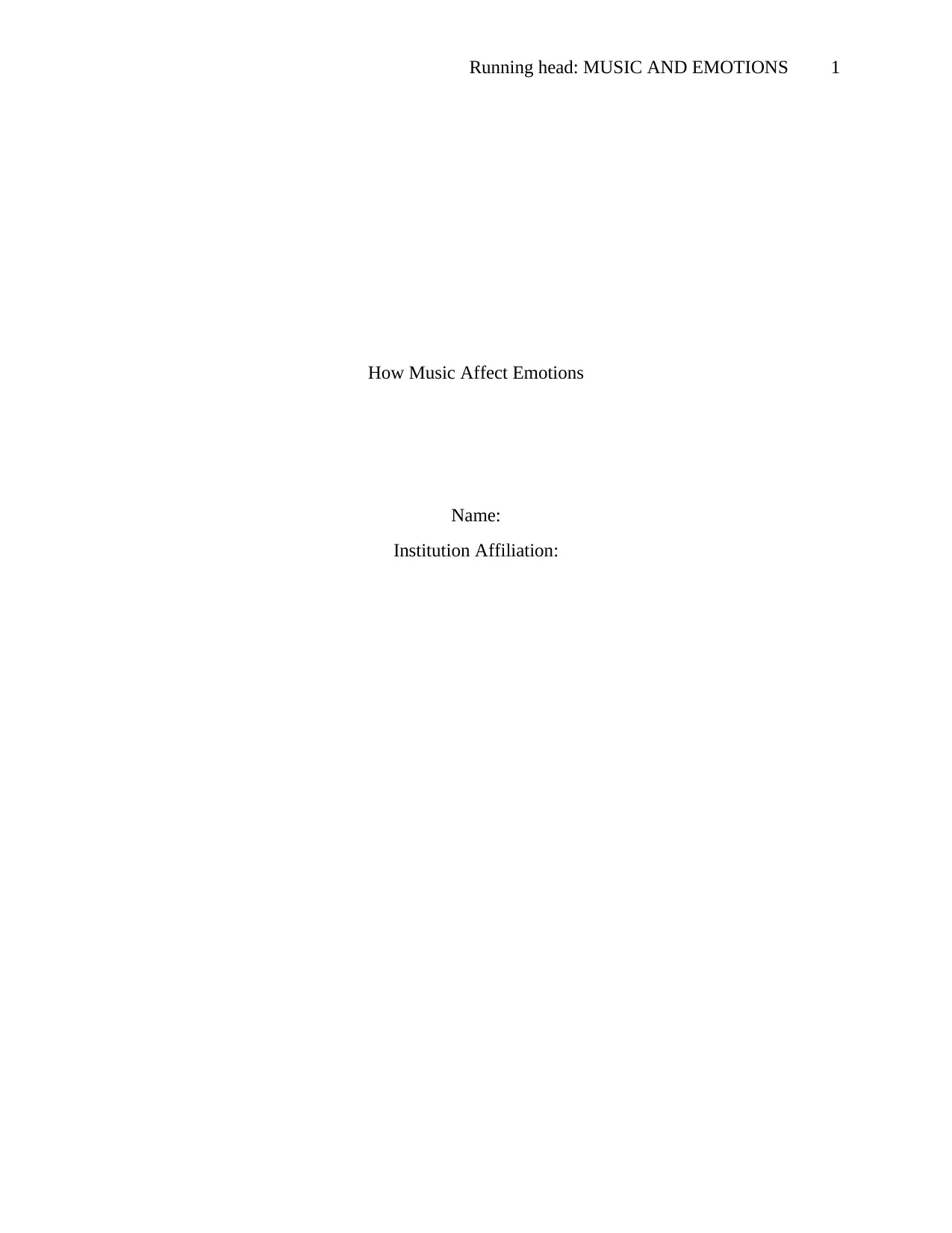
Running head: MUSIC AND EMOTIONS 1
How Music Affect Emotions
Name:
Institution Affiliation:
How Music Affect Emotions
Name:
Institution Affiliation:
Paraphrase This Document
Need a fresh take? Get an instant paraphrase of this document with our AI Paraphraser
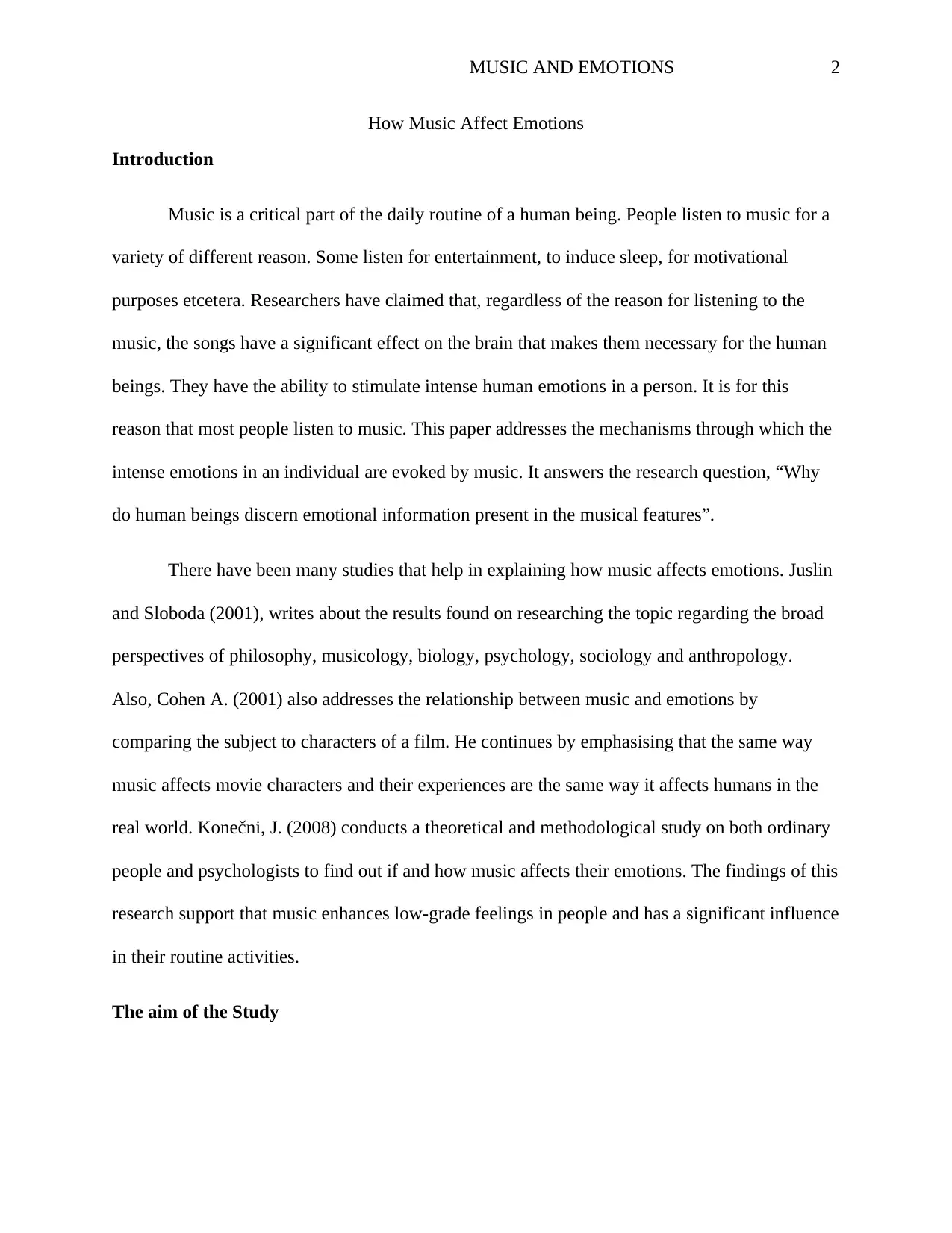
MUSIC AND EMOTIONS 2
How Music Affect Emotions
Introduction
Music is a critical part of the daily routine of a human being. People listen to music for a
variety of different reason. Some listen for entertainment, to induce sleep, for motivational
purposes etcetera. Researchers have claimed that, regardless of the reason for listening to the
music, the songs have a significant effect on the brain that makes them necessary for the human
beings. They have the ability to stimulate intense human emotions in a person. It is for this
reason that most people listen to music. This paper addresses the mechanisms through which the
intense emotions in an individual are evoked by music. It answers the research question, “Why
do human beings discern emotional information present in the musical features”.
There have been many studies that help in explaining how music affects emotions. Juslin
and Sloboda (2001), writes about the results found on researching the topic regarding the broad
perspectives of philosophy, musicology, biology, psychology, sociology and anthropology.
Also, Cohen A. (2001) also addresses the relationship between music and emotions by
comparing the subject to characters of a film. He continues by emphasising that the same way
music affects movie characters and their experiences are the same way it affects humans in the
real world. Konečni, J. (2008) conducts a theoretical and methodological study on both ordinary
people and psychologists to find out if and how music affects their emotions. The findings of this
research support that music enhances low-grade feelings in people and has a significant influence
in their routine activities.
The aim of the Study
How Music Affect Emotions
Introduction
Music is a critical part of the daily routine of a human being. People listen to music for a
variety of different reason. Some listen for entertainment, to induce sleep, for motivational
purposes etcetera. Researchers have claimed that, regardless of the reason for listening to the
music, the songs have a significant effect on the brain that makes them necessary for the human
beings. They have the ability to stimulate intense human emotions in a person. It is for this
reason that most people listen to music. This paper addresses the mechanisms through which the
intense emotions in an individual are evoked by music. It answers the research question, “Why
do human beings discern emotional information present in the musical features”.
There have been many studies that help in explaining how music affects emotions. Juslin
and Sloboda (2001), writes about the results found on researching the topic regarding the broad
perspectives of philosophy, musicology, biology, psychology, sociology and anthropology.
Also, Cohen A. (2001) also addresses the relationship between music and emotions by
comparing the subject to characters of a film. He continues by emphasising that the same way
music affects movie characters and their experiences are the same way it affects humans in the
real world. Konečni, J. (2008) conducts a theoretical and methodological study on both ordinary
people and psychologists to find out if and how music affects their emotions. The findings of this
research support that music enhances low-grade feelings in people and has a significant influence
in their routine activities.
The aim of the Study
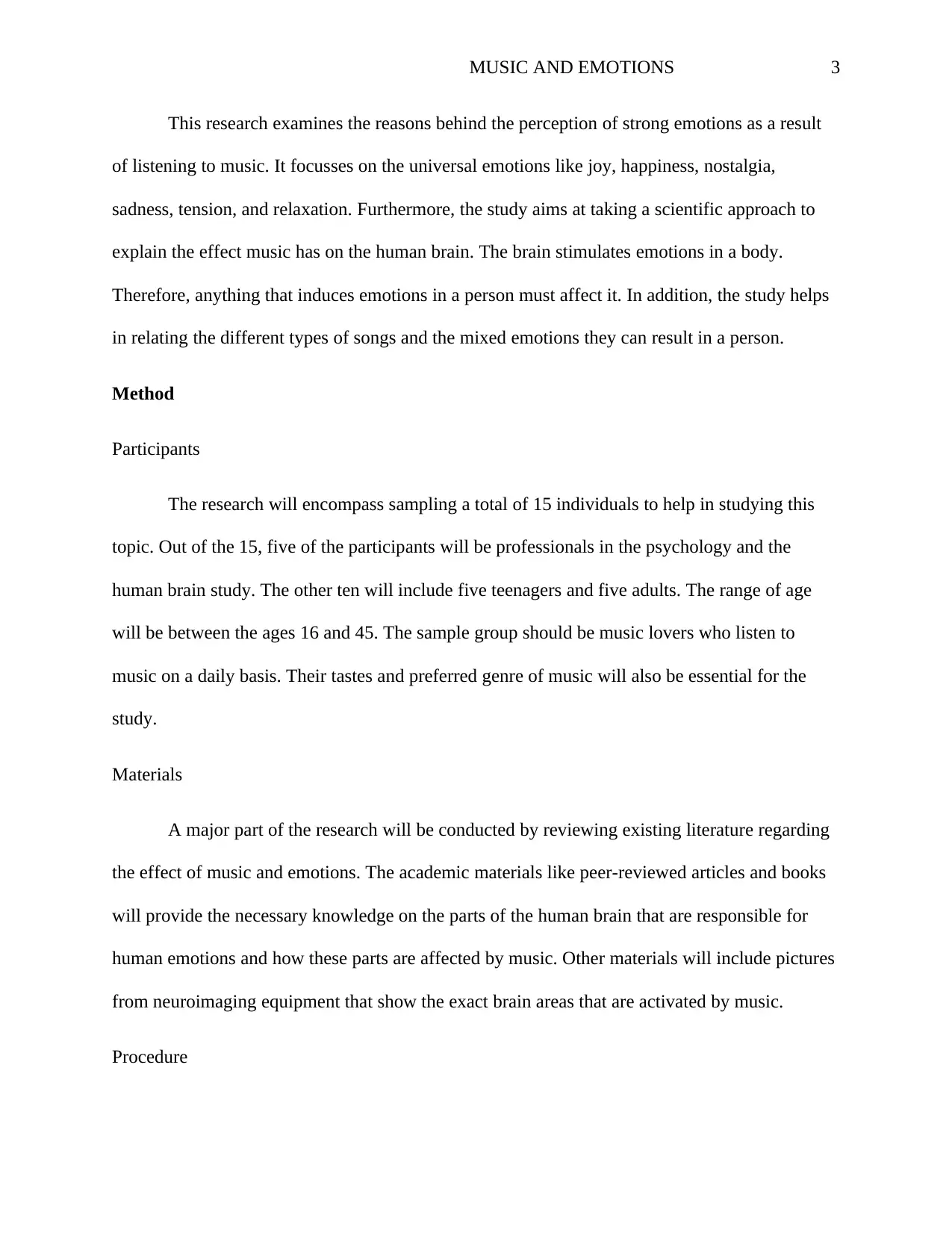
MUSIC AND EMOTIONS 3
This research examines the reasons behind the perception of strong emotions as a result
of listening to music. It focusses on the universal emotions like joy, happiness, nostalgia,
sadness, tension, and relaxation. Furthermore, the study aims at taking a scientific approach to
explain the effect music has on the human brain. The brain stimulates emotions in a body.
Therefore, anything that induces emotions in a person must affect it. In addition, the study helps
in relating the different types of songs and the mixed emotions they can result in a person.
Method
Participants
The research will encompass sampling a total of 15 individuals to help in studying this
topic. Out of the 15, five of the participants will be professionals in the psychology and the
human brain study. The other ten will include five teenagers and five adults. The range of age
will be between the ages 16 and 45. The sample group should be music lovers who listen to
music on a daily basis. Their tastes and preferred genre of music will also be essential for the
study.
Materials
A major part of the research will be conducted by reviewing existing literature regarding
the effect of music and emotions. The academic materials like peer-reviewed articles and books
will provide the necessary knowledge on the parts of the human brain that are responsible for
human emotions and how these parts are affected by music. Other materials will include pictures
from neuroimaging equipment that show the exact brain areas that are activated by music.
Procedure
This research examines the reasons behind the perception of strong emotions as a result
of listening to music. It focusses on the universal emotions like joy, happiness, nostalgia,
sadness, tension, and relaxation. Furthermore, the study aims at taking a scientific approach to
explain the effect music has on the human brain. The brain stimulates emotions in a body.
Therefore, anything that induces emotions in a person must affect it. In addition, the study helps
in relating the different types of songs and the mixed emotions they can result in a person.
Method
Participants
The research will encompass sampling a total of 15 individuals to help in studying this
topic. Out of the 15, five of the participants will be professionals in the psychology and the
human brain study. The other ten will include five teenagers and five adults. The range of age
will be between the ages 16 and 45. The sample group should be music lovers who listen to
music on a daily basis. Their tastes and preferred genre of music will also be essential for the
study.
Materials
A major part of the research will be conducted by reviewing existing literature regarding
the effect of music and emotions. The academic materials like peer-reviewed articles and books
will provide the necessary knowledge on the parts of the human brain that are responsible for
human emotions and how these parts are affected by music. Other materials will include pictures
from neuroimaging equipment that show the exact brain areas that are activated by music.
Procedure
⊘ This is a preview!⊘
Do you want full access?
Subscribe today to unlock all pages.

Trusted by 1+ million students worldwide
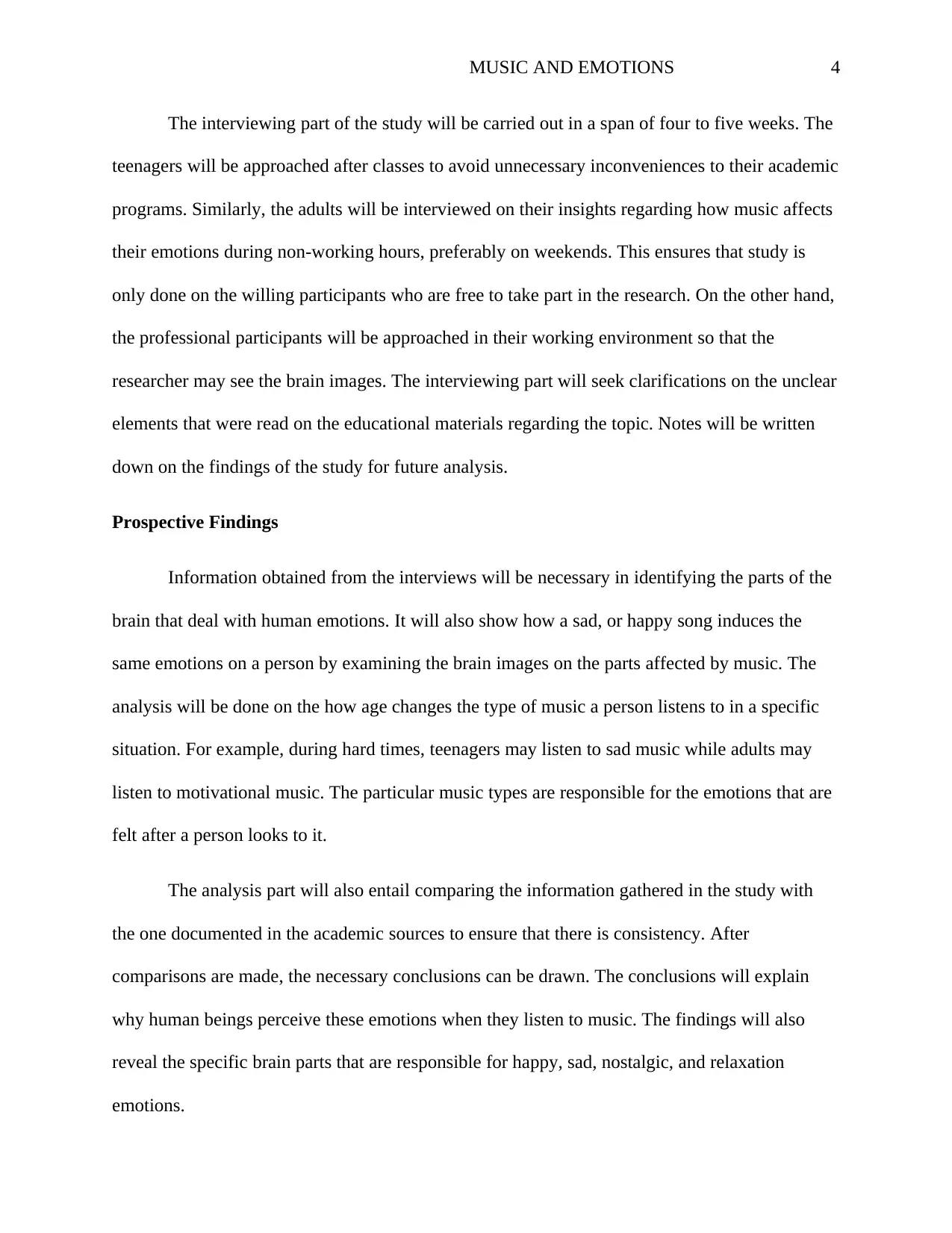
MUSIC AND EMOTIONS 4
The interviewing part of the study will be carried out in a span of four to five weeks. The
teenagers will be approached after classes to avoid unnecessary inconveniences to their academic
programs. Similarly, the adults will be interviewed on their insights regarding how music affects
their emotions during non-working hours, preferably on weekends. This ensures that study is
only done on the willing participants who are free to take part in the research. On the other hand,
the professional participants will be approached in their working environment so that the
researcher may see the brain images. The interviewing part will seek clarifications on the unclear
elements that were read on the educational materials regarding the topic. Notes will be written
down on the findings of the study for future analysis.
Prospective Findings
Information obtained from the interviews will be necessary in identifying the parts of the
brain that deal with human emotions. It will also show how a sad, or happy song induces the
same emotions on a person by examining the brain images on the parts affected by music. The
analysis will be done on the how age changes the type of music a person listens to in a specific
situation. For example, during hard times, teenagers may listen to sad music while adults may
listen to motivational music. The particular music types are responsible for the emotions that are
felt after a person looks to it.
The analysis part will also entail comparing the information gathered in the study with
the one documented in the academic sources to ensure that there is consistency. After
comparisons are made, the necessary conclusions can be drawn. The conclusions will explain
why human beings perceive these emotions when they listen to music. The findings will also
reveal the specific brain parts that are responsible for happy, sad, nostalgic, and relaxation
emotions.
The interviewing part of the study will be carried out in a span of four to five weeks. The
teenagers will be approached after classes to avoid unnecessary inconveniences to their academic
programs. Similarly, the adults will be interviewed on their insights regarding how music affects
their emotions during non-working hours, preferably on weekends. This ensures that study is
only done on the willing participants who are free to take part in the research. On the other hand,
the professional participants will be approached in their working environment so that the
researcher may see the brain images. The interviewing part will seek clarifications on the unclear
elements that were read on the educational materials regarding the topic. Notes will be written
down on the findings of the study for future analysis.
Prospective Findings
Information obtained from the interviews will be necessary in identifying the parts of the
brain that deal with human emotions. It will also show how a sad, or happy song induces the
same emotions on a person by examining the brain images on the parts affected by music. The
analysis will be done on the how age changes the type of music a person listens to in a specific
situation. For example, during hard times, teenagers may listen to sad music while adults may
listen to motivational music. The particular music types are responsible for the emotions that are
felt after a person looks to it.
The analysis part will also entail comparing the information gathered in the study with
the one documented in the academic sources to ensure that there is consistency. After
comparisons are made, the necessary conclusions can be drawn. The conclusions will explain
why human beings perceive these emotions when they listen to music. The findings will also
reveal the specific brain parts that are responsible for happy, sad, nostalgic, and relaxation
emotions.
Paraphrase This Document
Need a fresh take? Get an instant paraphrase of this document with our AI Paraphraser
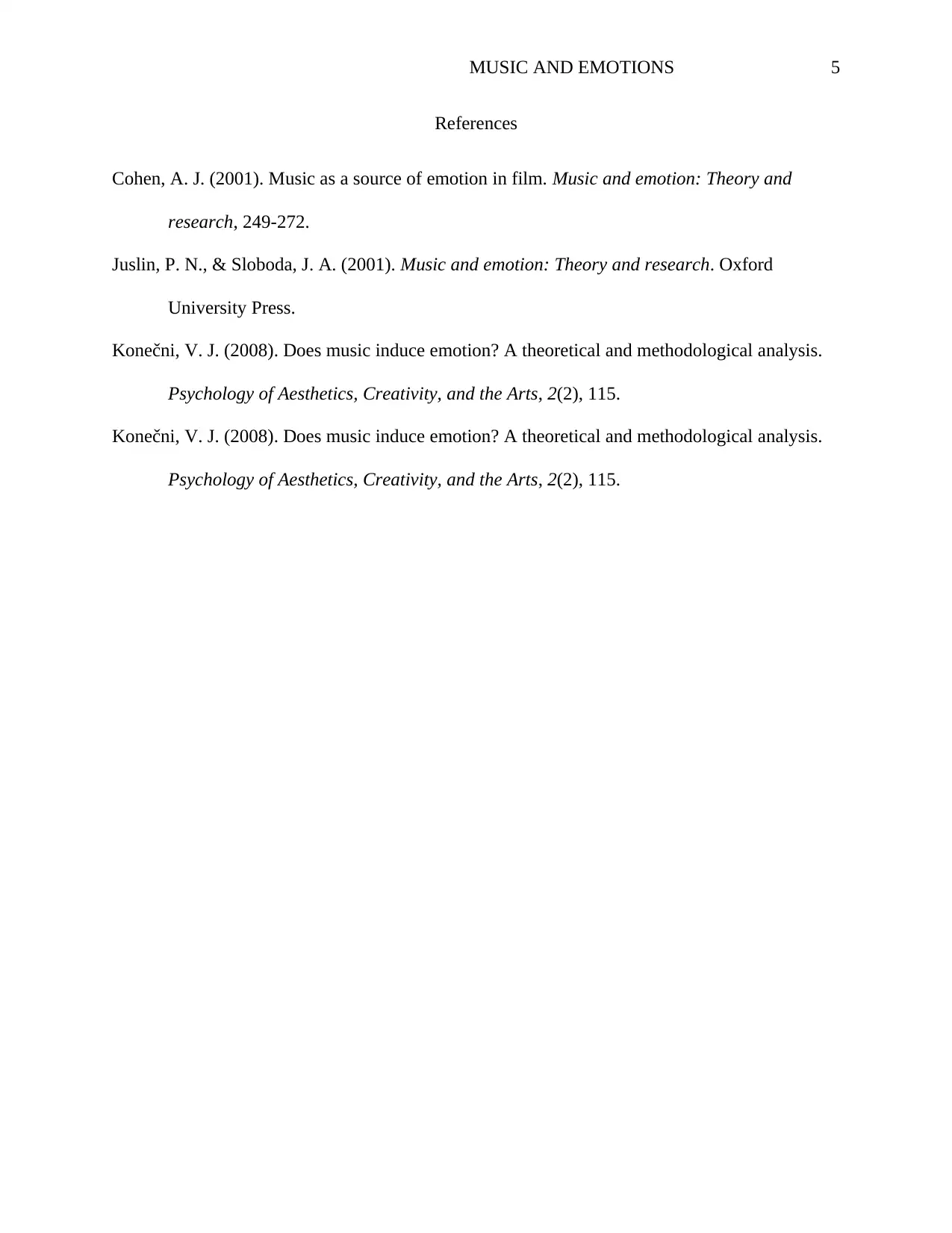
MUSIC AND EMOTIONS 5
References
Cohen, A. J. (2001). Music as a source of emotion in film. Music and emotion: Theory and
research, 249-272.
Juslin, P. N., & Sloboda, J. A. (2001). Music and emotion: Theory and research. Oxford
University Press.
Konečni, V. J. (2008). Does music induce emotion? A theoretical and methodological analysis.
Psychology of Aesthetics, Creativity, and the Arts, 2(2), 115.
Konečni, V. J. (2008). Does music induce emotion? A theoretical and methodological analysis.
Psychology of Aesthetics, Creativity, and the Arts, 2(2), 115.
References
Cohen, A. J. (2001). Music as a source of emotion in film. Music and emotion: Theory and
research, 249-272.
Juslin, P. N., & Sloboda, J. A. (2001). Music and emotion: Theory and research. Oxford
University Press.
Konečni, V. J. (2008). Does music induce emotion? A theoretical and methodological analysis.
Psychology of Aesthetics, Creativity, and the Arts, 2(2), 115.
Konečni, V. J. (2008). Does music induce emotion? A theoretical and methodological analysis.
Psychology of Aesthetics, Creativity, and the Arts, 2(2), 115.
1 out of 5
Related Documents
Your All-in-One AI-Powered Toolkit for Academic Success.
+13062052269
info@desklib.com
Available 24*7 on WhatsApp / Email
![[object Object]](/_next/static/media/star-bottom.7253800d.svg)
Unlock your academic potential
Copyright © 2020–2025 A2Z Services. All Rights Reserved. Developed and managed by ZUCOL.





